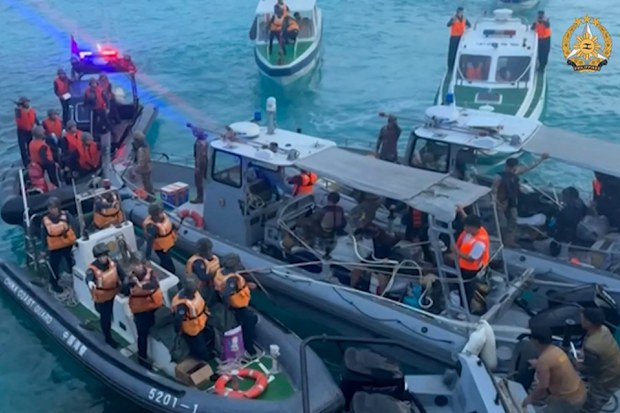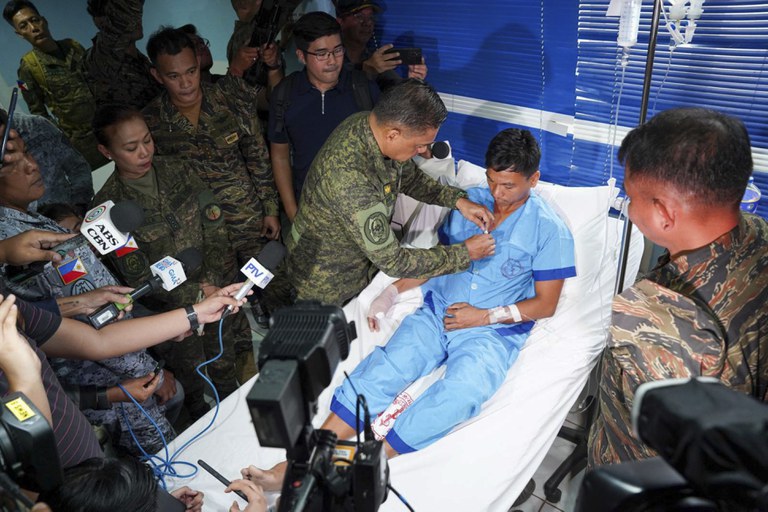Philippines won’t publicize resupply mission schedule to disputed shoal
2024.06.24
Manila
 This frame grab from handout video taken on June 17, 2024, and released by the Armed Forces of the Philippines Public Affairs Office on June 19, shows China coast guard boats (left) approaching Philippine boats (center) during an incident off Second Thomas Shoal in the South China Sea.
This frame grab from handout video taken on June 17, 2024, and released by the Armed Forces of the Philippines Public Affairs Office on June 19, shows China coast guard boats (left) approaching Philippine boats (center) during an incident off Second Thomas Shoal in the South China Sea.
Manila will not announce resupply missions to a disputed shoal ahead of time, the defense department said Monday, as it accused Chinese personnel of behaving aggressively and using “illegal” force in a tense encounter with Filipino sailors there last week.
During the June 17 incident at Second Thomas Shoal near a grounded Philippine ship, the BRP Sierra Madre, China Coast Guard boats intercepted a rigid-hulled inflatable boat belonging to the Philippine Navy. A Filipino sailor lost a finger when a Chinese boat rammed a Philippine boat taking part in a resupply mission there, Filipino officials said.
The incident was the latest and most serious encounter between the two countries in the disputed waters in recent months.
“We reiterate that we seek neither permission nor consent from anyone in performing our sworn duties in the West Philippine Sea,” Defense Secretary Gilberto Teodoro Jr. said, referring to South China Sea waters within Manila’s exclusive economic zone.
“In this regard, we will continue our rotation and resupply (RORE) missions on a regular basis, the welfare of our troops in the BRP Sierra Madre being a matter of utmost importance. The president has reiterated that we will not publish schedules of any RORE,” Teodoro said during a press briefing.
On Friday, the National Maritime Council had recommended the contrary – that Manila publicize dates of its resupply missions to the shoal.
The Philippines runs regular RORE missions to the Sierra Madre. The old ship serves as Manila’s military outpost in the contested waters near Mischief Reef, an artificial island where Beijing built a naval base in the 1990s.
China has opposed the Philippines’ transportation of construction materials to refurbish the Sierra Madre.
Teodoro said the June 17 incident was an “aggressive and illegal use of force,” contradicting an earlier statement by Lucas Bersamin, President Ferdinand Marcos Jr.’s executive secretary, who had described it as only a “misunderstanding or accident.”
“We see the latest incident in Ayungin not as a misunderstanding or an accident,” Teodoro said, referring to the local name of the shoal. “It is a deliberate act of the Chinese officialdom to prevent us from completing our mission.”
Asked for comment on Bersamin’s previous statement, the defense secretary said the executive secretary’s pronouncement was just based on a “preliminary assessment.”
“After our visit to our troops in Palawan yesterday, we have now come to the conclusion that it was not a misunderstanding or an accident. We are not downplaying the incident,” Teodoro stressed.
Despite China’s actions, Teodoro said the Philippines would “continue to find peaceful solutions to this issue.”
On Monday, Beijing reiterated its claim over the disputed reef.
“The Philippines should stop infringement and provocation and return to the right track of solving maritime disputes properly through negotiation and consultation and work with China to jointly maintain peace and stability in the South China Sea,” Chinese foreign ministry spokesperson Mao Ning said in a press briefing.
Marcos’ visit to troops
On Sunday, President Marcos visited troops, including sailors involved in the June 17 mission, at the Armed Forces of the Philippines-Western Command in Puerto Princesa City, Palawan.
Marcos said the country’s “calm and peaceful disposition should not be mistaken for acquiescence.”

Marcos bestowed the Order of Lapu-Lapu to the 80 military personnel who took part in the June 17 mission to Sierra Madre. These included Seaman First Class Underwater Operator Jeffrey Facundo, who lost a finger in the incident.
Created in 2017, the Order of Lapu-Lapu is awarded to individuals in recognition of their invaluable or extraordinary service concerning the President’s campaign or advocacy.
In 2016, the Philippines won a landmark arbitral ruling against Beijing after Manila had filed a case against the Asian giant, which claims almost the entire resource-rich sea.
The ruling invalidated the assertions of China, which has since refused to acknowledge the decision and insisted on its historical claims.







